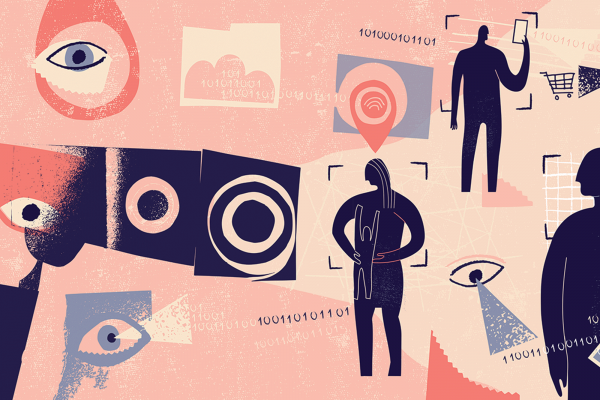WHEN MY WIFE and I moved into our new house, one of the first things we did was tear out the surveillance system. The Ring cameras, the security keypads, the wires arming windows and doors — all of it. Previous owners, according to neighborhood lore, had run a small meth lab out of a camper on the property (until they caught themselves on fire and burned much of the house down). They survived, but the “all-seeing eyes” of an ADT Smart Alarm did not protect them from themselves.
As we envisioned how our house would become a home, we did not desire the kind of security and protection that depends on surveillance products. More importantly, we wanted to order our lives in a way where true security is based on neighboring — not false security sold by techno-corporations.
In God, Neighbor, Empire, Old Testament scholar Walter Brueggemann identifies three characteristics of ancient and contemporary empires: wealth extraction from the vulnerable to the powerful; policies of commodification in which everything and everyone can be bought and sold; and willingness to use violence “on whatever scale was required” to secure the first two.
The Bible is a story of empires and so it’s full of spies, surveillance systems, and commodifying fear.
In Numbers, Moses sent 12 spies to surveil Canaan for 40 days. Intrigue spiked when 10 of the spies brought back fabricated data to the people of Israel — and the people believed it. God punishes the Israelites by condemning them to wander for 40 years in the wilderness. Torah scholar Avivah Gottlieb Zornberg writes that this is “the critical point, the great failure, that radically changes the future history of the people.”
The book of Ecclesiastes is written from inside a totalizing imperial system in which all hope is crushed, and every move is watched. “Even in your thoughts, do not curse the king, nor in your bedroom curse the rich, for a bird of the air will carry your voice, or some winged creature tell the matter” (10:20).
In the New Testament, Jesus is the target of surveillance from infancy. Herod attempts to use the Magi to track Jesus’ location (Matthew 2:7, 16). While Jesus taught in Jerusalem, spies “who pretended to be sincere” were sent to entrap him (Luke 20:20). And finally, the authorities appear to flip one of Jesus’ insiders, leading to his arrest (Luke 22:1-6) and eventual death sentence.
The next thing my wife and I did when we moved was to print out a map of our neighborhood — then we started walking. We walked at varying times of day. We nodded and waved to neighbors, introduced ourselves to the dog-walkers, and started marking down the names of neighbors on our map. We put chairs in the front yard as an invitation for others to stop by for a chat. We attended the local elementary school open house, even though we don’t have children attending there. On Epiphany, we delivered baked goods to the neighbors nearest us. For us, this is what “neighboring” looks like. This is all part of our multilayered relational security system.
But what about when it doesn’t work — when people steal packages or the hub caps off the car? This is part of the paradox of trust. “Justice, mercy, and the public good all find meaning in relationship — a relationship dependent upon fidelity, but endlessly open to the betrayals of infidelity,” writes Brueggemann. Just as we break God’s trust, so others break our trust. Repairing broken promises to restore justice can build deeper relationships. Tending to neighborliness requires generosity, vulnerability, stability, and a willingness to sustain relationships. It means keeping our eye out for kids walking to school and elders living alone — not installing a Ring camera to catch porch pirates.
Baptist theologian Eric Stoddart writes, “It is the crucified God who frees us to suffer (and to celebrate and to protest) and it is he, who was under others’ watchful gaze seeking to entrap him, who is in solidarity with all subjects of surveillance.”
We are inheritors of an ancient narrative that shapes our lives if we let it. Under whose watchful gaze do we choose to live?

Got something to say about what you're reading? We value your feedback!







